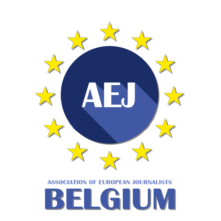
By Sonja Rijnen
Media shapes public opinion. It guides our understanding of the power structures that affect our daily lives and underpins the functioning of strong democracies. Naturally, journalists have a pivotal role to play in this.
“Everything relies on Journalists,” David Mekkaoui, managing director of Europe MédiaLab, told AEJ Belgium in an interview. To this end, the organisation, a “think-and-do-tank”, aims to support a healthy media sector in Europe through projects that seek to enhance cooperation between outlets, especially across European countries. Their latest project: Maison du MédiaLab, aims to strengthen the coverage of the European news in underrepresented countries.
Under-representation in Brussels’ press corps
There are over one thousand accredited journalists in Brussels who regularly cover EU affairs, most of whom are foreign correspondents working for news organisations in their home countries. In June 2024, there were 101 journalists from Germany, 28 from The Netherlands, 11 from Greece, 12 from Portugal and 5 from Slovenia based in the Belgian capital.
What Europe MédiaLab realised is that there were hardly any Brussels-based journalists from EU neighbours such as Ukraine (4), Moldova (0), Georgia (3) and Armenia (2). In fact, Ukraine’s national broadcaster Suspline, has no reporters in Brussels at all.
This is a problem, says Mekkaoui. The low number of journalists representing certain Eastern European media organisations affects the quality of information that citizens of these countries receive. Since many of these countries on Europe’s eastern border are in accession processes to join NATO and the EU, or receive large sums of EU money, it is essential that their citizens have access to quality news on what is happening in Brussels.
To achieve this, more journalists need to be based in Brussels. “Hearing about a story is different from living it yourself,” Mekkaoui noted. Media from Ukraine, Moldova, Georgia and Armenia, mostly rely on second-hand sources for their information on EU news and, as these countries are more susceptible to misinformation and influence from Russia, it is important to empower journalists to get information from their own sources, on their own terms.
The key reason why there are so few journalists from these countries in Brussels, he said, is money. It has become clear in Europe MédiaLab’s research that there is the will among news organisations to send foreign correspondents to Brussels, but they simply cannot afford to have them there.
The ‘Maison du MédiaLab’ project
This is where the Maison du MédiaLab project comes in. Euractiv founder Christophe Leclercq and his wife Sharon Leclercq will be opening their home (initially from 2024-2029) in Etterbeek, Brussels, to host journalists from these underrepresented countries for free.
Initially, the project will focus on Ukrainian, Armenian, Moldovan and Georgian members of the press and, every six months, six journalists will be hosted in their house. They will also be paired with coaches from the media sector who will provide training and support to the journalists to build a career in Brussels. To highlight how essential the training element of the project is, Mekkaoui points out that ambassadors must often give visiting journalists from their countries a ‘crash course’ in EU affairs when they come to cover a European Summit.
The aim is to increase the number of journalists from under-represented Eastern European countries based in Brussels from 20 to 60 by 2029. Once media outlets experience the benefits (monetary or otherwise) of having Brussels-based correspondents during the six months, they will be more able to support the long-term relocation of the journalist to Brussels.
Benefits for Brussels
Importantly, Mekkaoui said, not only the media landscape of the countries will benefit from having correspondents on the ground, but Brussels itself will benefit significantly from having a more diverse press corps too.
Firstly, the project will help meet the demands of Brussels’ decision-makers who spend billions of euros on Eastern European projects every year. Often, their knowledge of the region is based only on short trips. Having more journalists from this region in Brussels will help hold officials accountable about topics relating to this area. Europe MédiaLab believes that decision-makers want more journalists from Eastern Europe in Brussels to enhance the ability of those in power to make informed decisions.
The project should also help forge connections between journalists in Europe. German, Dutch and Slovenian reporters create content about Eastern Europe, especially Ukraine, almost daily. It has become clear to Europe MédiaLab that these journalists would appreciate opportunities to speak to other members of the press from the countries concerned, who have invaluable insights. This in turn will enhance the quality of news that we consume in the rest of Europe.
Finally, at a more local level, the ‘Maison’ (house) of the MédiaLab, where the journalists will be staying, will become a cultural hub in Brussels. The idea is for the journalists to invite locals into the house to learn about their cultures, taste a traditionally made borscht (or even learn how to make one), or connect over political debate. The project therefore offers excellent opportunities for cultural exchange.
Funding the project
The project is well underway in securing the necessary funds. Fundraising began in May 2024, but they are still searching for donors. Those who contribute financially can even become co-founders of the Maison du MédiaLab.
Considering the increasing importance of the EU and NATO accession talks, the war taking place on Europe’s Eastern border and the need to protect citizens from disinformation, the Maison du MédiaLab Lab project seems to be more relevant than ever.
For more information on how to get involved, either by donating or coaching, please visit the Maison du MédiaLab website.
